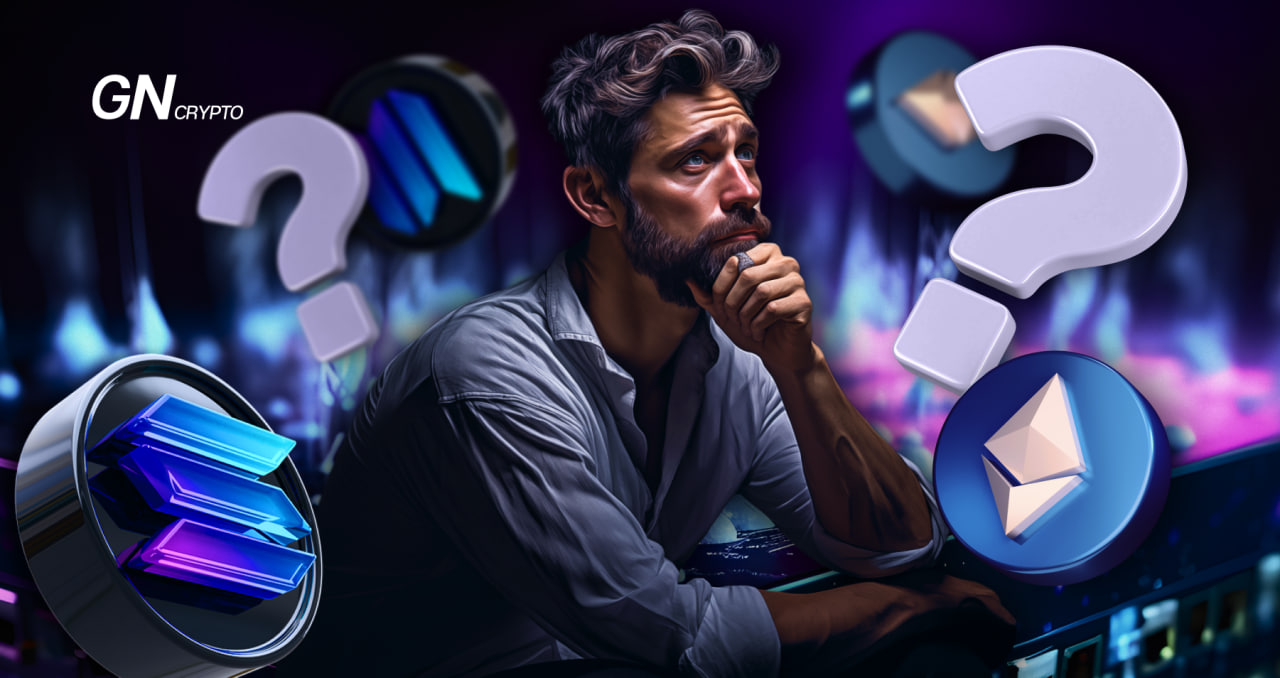Ethereum vs Solana: Choosing the Optimal Blockchain

As the blockchain world evolves, choosing between Ethereum and Solana is becoming a critical decision, especially for those new to the crypto market. These platforms each have their distinct features, making the choice of which network to use a complex one.
On this page
What Sets Them Apart?
Experts often debate the necessity of new Layer1 developments in light of Ethereum's clear dominance in this area. It's generally accepted that Buterin's project has triumphed in the Layer1 league, but there are contenders (like Solana, Avalanche, BNB Chain, and others) that challenge this view and are keen to continue the competition.
Avalanche stands out with its modular architecture, enabling seamless blockchain building through its subnetworks (X-Chain, C-Chain, and P-Chain).
The BNB network, established to tackle the issue of Ethereum's hefty gas fees, has launched opBNB L2 on BSC, broadening the accessibility of transactions.
In this article, we’ll focus on a detailed comparison of Ethereum and Solana, particularly in the context of blockchain's modular structure. These two projects share many similarities, with Solana even being labeled as the potential “Ethereum killer.”
It's generally accepted that any blockchain must find a balance between security, scalability, and decentralization. This is the notorious blockchain trilemma, a practical solution for which remains elusive. Thus, the choice often boils down to a trade-off between speed and the risk of external control.
Ethereum: Trustworthy and Decentralized
Ethereum ranks among the most esteemed blockchains, celebrated for its stability and substantial decentralization level (though the pre-mining of ETH has sparked controversy over the project's possible pseudo-decentralization).
Originally developed for smart contracts, Ethereum has emerged as the fundamental platform for decentralized finance (DeFi) and non-fungible tokens (NFTs).
Yet, the network faces challenges with its high transaction fees and relative slowness, prompting the crypto community to anticipate newer projects that can offer more effective scalable solutions.
Solana: Blazing Speed and Cutting-Edge Architecture
Solana, contrasting Ethereum, brings to the table a unique design focused on solving the blockchain trilemma.
As a Layer1 blockchain with an impressive throughput capacity, Solana offers the promise of fast and cost-effective transactions, substantially curtailing the need for intricate Layer 2 solutions.
Its unique Proof-of-History approach for transaction sequencing distinctly sets it apart from its blockchain counterparts.
This network is acclaimed for its rapid value transfer capabilities.However, concerns have been raised about its level of decentralization and the initial distribution of tokens: around half of SOL was allocated to insiders and venture capitalists at launch. Moreover, the network's level of security has also been a recurring point of debate.
Ethereum vs Solana: Which to Choose?
The decision between Ethereum and Solana boils down to your individual needs and goals. If you are a committed holder or deal with significant sums, Ethereum appears to be the more appealing option due to its higher security level. It utilizes the SHA-3 (Keccak) algorithm, acknowledged as one of the best defenses against hacks.
If transaction speed is critical for your daily trading activities, then Solana might be the better fit. It boasts lower data transfer costs and faster transaction finalization.
It's also crucial to consider the diverse applications of each platform. Ethereum remains the frontrunner in DeFi and NFT sectors, whereas Solana is currently making strides in GameFi, Metaverse, and DApps. Despite the Solana team's efforts towards strong partnerships with NFT marketplaces, it has yet to challenge Ethereum's dominant position effectively.
Ultimately, the choice between Ethereum and Solana is a matter of personal investment priorities and trading necessities. A sensible approach involves evaluating the strengths and weaknesses of each blockchain and making a choice that aligns with your investment strategy and expectations in the cryptocurrency market.
The content on The Coinomist is for informational purposes only and should not be interpreted as financial advice. While we strive to provide accurate and up-to-date information, we do not guarantee the accuracy, completeness, or reliability of any content. Neither we accept liability for any errors or omissions in the information provided or for any financial losses incurred as a result of relying on this information. Actions based on this content are at your own risk. Always do your own research and consult a professional. See our Terms, Privacy Policy, and Disclaimers for more details.

























